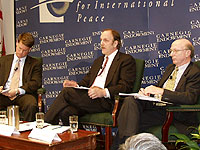Registration
You will receive an email confirming your registration.
IMGXYZ539IMGZYXOn October 12, 2006, the Carnegie Endowment for International Peace, in collaboration with the Henry L. Stimson Center, hosted a discussion prompted by the apparent North Korea nuclear test entitled “Next steps on North Korea: Options Beyond Sanctions” IMGXYZ538IMGZYXwith Randy Schriver, a founding partner of Armitage International LLC and a Senior Associate at the Center for Strategic and International Studies (CSIS), and Alan D. Romberg, Senior Associate at the Henry L. Stimson Center. Carnegie Senior Associate Michael Swaine moderated the discussion. A summary of the event follows.
In his introductory remarks, Carnegie Senior Associate Michael Swaine framed the discussion by outlining the relevant issues with regard to the recent North Korean nuclear test: Can the five “other” countries involved in the six-party talks (China, United States, South Korea, Russia and Japan) agree on how to proceed in such a way that would dissuade other states that are contemplating the acquisition of nuclear weapons from pursuing their own nuclear programs? Can they agree on a common objective, beyond mere punishment of North Korea that addresses denuclearization of North Korea as well as concerns that North Korea will proliferate whatever capability it may have? And finally, can they agree on the viable means necessary to reach these objectives?
Alan D. Romberg focused his comments on the U.S. position and the next steps in relation to recent events. According to Romberg, the U.S. objectives of comprehensive, verifiable, irreversible nuclear disarmament are the correct ones; the problem has been in the execution of these goals. A major aspect of this policy was supposed to be the transformation of the US-DPRK relationship; Romberg thinks that U.S. diplomacy failed in this respect.
The priority concern of the United States, according to President Bush, is proliferation. However, a proposal to ramp up PSI (Proliferation Security Initiative) is not only unwise (it could cause an escalation in the conflict), it is also unlikely to garner the necessary international support. He observed that gaining unanimity on a sound resolution is the crucial issue, not getting every American suggestion into the resolution. Romberg also noted that even if the current U.S. draft resolution were to be adopted by the Security Council, which he highly doubts, this measure by itself is also unlikely to resolve the issue. For a policy to have any prospect of success it has to have some positive appeal for North Korea; a U.S. policy designed to corner the North into submission is bound to fail. In short, for any U.S. proposal to enjoy unanimity among the five, it must contain less severe measures.
Randy Schriver divided his remarks into three issue areas: the strategic landscape, the specific actions taken or that will be taken in the near term, and recommendations for U.S. policy. The apparent nuclear test was a very provocative act because it occurred after the July missile tests and in spite of the urging by South Korea and China not to test. However, according to Schriver, the apparent test does not introduce a new DPRK capability and consequently does not drastically change the strategic landscape; U.S. policymakers have been working under the assumption that the North had these capabilities for almost a decade.
Three possible things could, however, drastically change the strategic landscape: a state decision by North Korea to become a more active proliferator; a change in the position of states otherwise not inclined to pursue nuclear weapons to do so as a result of the apparent DPRK nuclear test; and lastly, a further push by states that are inclined to pursue nuclear weapons outside of legal means and treaty obligations to do so. According to Schriver, U.S. policymakers and analysts should be focusing on these three issues instead of on the North Korean act itself.
Schriver also commended the performance of Japan’s new Prime Minister Shinzo Abe in the face of this crisis and commented that even though hard-line statements from the U.S. administration before the test limited American diplomatic options, the U.S. response thereafter has been quite reasonable. The United States should seek opportunities as a result of this crisis, such as the strengthening of relations with Japan and South Korea or increasing cooperation with China on the North Korea issue.
In terms of important steps to take in the aftermath, Schriver noted that the United States needs to be clear about its position (is the U.S. seeking regime change or regime behavior change?) and about what actions on the part of North Korea will lead to a more aggressive, if not military, response from the United States. The United States needs to also provide a second path for North Korea to give it a chance to de-escalate the crisis. Furthermore, a timely UN resolution that shows international solidarity is more important than a perfect resolution. Schriver doubts that Japan, South Korea, or Taiwan will be encouraged to pursue their own nuclear programs as a result of this, but stresses that U.S. actions will have an effect on the decisions made by states like Iran.
Carnegie Senior Associate Michael Swaine concluded by stating that given the circumstances, one is most likely to see “a minimum level of agreement which will place most emphasis on punishment for this initial action that is limited in nature, a return to some kind of dialogue through the six-party talks most likely with continuing desire to go toward denuclearization but little progress in that direction for the foreseeable future, and greater emphasis among the five parties of trying to reach agreement on deterring North Korea from conducting future tests and preventing proliferation.”
In the Q&A period, Michael Swaine and Alan D. Romberg addressed questions about the possibility of U.S. pre-emptive action against North Korea, the future of the South Korea sunshine policy, China’s position, why North Korea decided to test, why and to whom would North Korea proliferate, preconditions for successful deterrence, the issue of sanctions, and the possible role of PSI.
